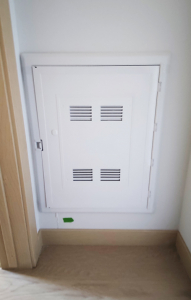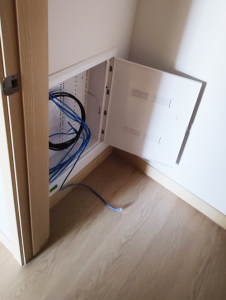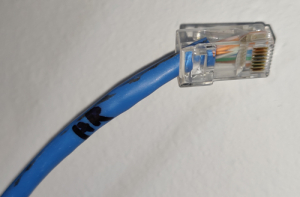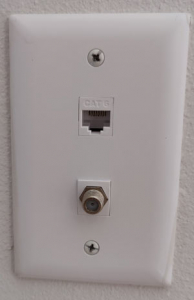Talk Human to Human NOW!
For Businesses Call:
608.836.0282
For Residential Support Call:
608.237.6152
Cheers to local, fast, friendly Internet! Below you’ll find information about how to connect to the Internet in your home and how to contact us if you have any issues.
First you must purchase a router. We recommend looking for these features.
Connecting a router to an ethernet jack in your Cariad apartment involves a brief series of some fairly simple steps. This guide will help you set up your router for a seamless internet connection.
Remember, specific router models may have slightly different setup procedures, so always refer to your router’s manual for detailed instructions.
Here’s a general step-by-step guide to get you started:
1. Unpack Your Router
Unbox your router and identify its components. Typically, this includes the router itself, a power adapter, an ethernet cable, and possibly an installation guide.
2. Locate the Media Panel
Your media panel is typically located in a storage area or in the closet. It is a white metal box in your wall that when you open it should have some Ethernet cables, and potentially some coax cables as well. One of the cables should be labeled as “HR” which is going to go into your WAN port on your router.


3. Connect the Router to the HR cable in your media panel
a. Plug the ethernet cable labeled “HR” into the WAN (Wide Area Network) port on your router. This port is often distinguished by its color or labeled as “WAN,” “Internet,” or has a symbol that resembles the globe.
b. If there are other cables labeled “BR” (for bedroom) or “LR” (for living room) into the LAN ports on your router. This will allow ethernet connections on the ports located in the associated rooms where applicable.
c. Now all rooms in your apartment are connected.

4. Power On Your Router
a. Connect the power adapter to your router and plug it into a power outlet.
b. Switch on the router. Wait for a minute or two for the router to start up. You should see indicator lights turning on, usually one indicating power and another indicating internet connectivity.
5. Locate the Ethernet Jack in your living area(s)
Find the ethernet jack in your apartment. It’s usually located on a wall in living areas or bedrooms. This wall jack will have a ethernet jack labeled “CAT 6” and may share a coax connection in the same wall plate.

6. Connect to Your Router
You can connect to your router either using a wireless connection or through another ethernet cable.
7. Configure Your Router
a. Open a web browser on your connected device.
b. Enter the router’s default IP address in the address bar (commonly 192.168.1.1 or 192.168.0.1; check your router’s manual for the exact address).
c. Log in using the default username and password (often “admin” for both, found on the router or in its manual).
d. If your device is new, follow the setup wizard to configure your network settings. This may include changing your network name (SSID), setting a new password, configuring network encryption, and updating the router’s firmware. For many routers, if you do not complete this step, you will not be able to connect to the Internet.
8.Connect Your Devices
Now that your router is set up, you can connect your devices to the internet by selecting your network’s name (SSID) from their Wi-Fi list and entering the password you’ve set up.
Troubleshooting
You can easily enable Internet to all your jacks in your apartment by connecting the rest of the ethernet cables within the media panel (potentially labeled “LR,” “BR” etc.) into the LAN ports on your router.